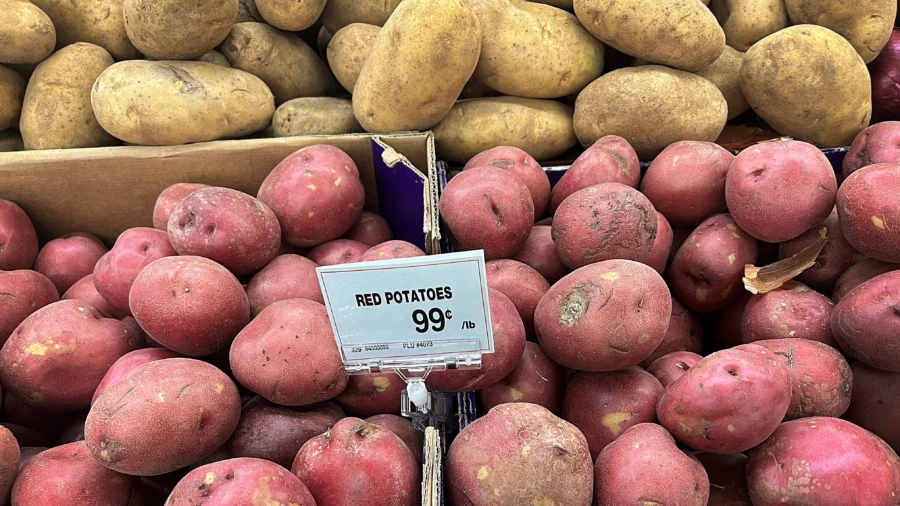Potatoes will officially be classified as a vegetable and not a grain after the U.S. Department of Agriculture (USDA) threw its support behind keeping the current classification in place, according to Sen. Susan Collins (R-Maine).
The lawmaker said in a press release Wednesday that she had received a call from USDA Secretary Thomas Vilsack on Tuesday, during which he informed her that the agency would “officially support” keeping the household staple classified as a vegetable.
Senator Collins welcomed the news, adding that she had feared reclassifying the potatoes—which are one of Maine’s key crops—would have sent a “false message to the public that the USDA believes that potatoes are not healthy.”
“The fact is, when prepared properly, the potato is a wonderfully nutritious food that is affordable, easy to transport, has a long storage life, and can be used in a wide array of recipes,” Senator Collins said.
“I am pleased Secretary Vilsack called me personally to tell me that the USDA has no intention of reclassifying potatoes and recognizes that potatoes are, in fact, a vegetable. I urge the DHHS to follow the USDA’s lead and recognize the same reality,” she continued.
The decision followed concerns among a bipartisan group of senators over reclassifying the starchy root vegetable as a grain during the Dietary Guidelines for Americans (DGAs) process.
In a letter to Mr. Vilsack in March, the group—led by Senator Michael Bennet, a Democrat from Colorado—had opposed reclassifying potatoes, noting that the USDA had, since its inception, classified potatoes “correctly” as a vegetable.
Changes Could ‘Come at a Cost’
“There is no debate about the physical characteristics of the potato and its horticultural scientific classification,” the group wrote. “Unlike grains, white potatoes are strong contributors of potassium, calcium, vitamin C, vitamin B6, and fiber.”
The group further argued that the reclassification could leave consumers missing out on vital nutrients.
“In addition, any change to potatoes’ current classification under the DGAs would immediately confuse consumers, retailers, restaurant operators, growers, and the entire supply chain,” they wrote.
Meanwhile, federal nutrition programs rely on the DGAs to ensure that program beneficiaries are receiving well-balanced, nutritious food, meaning that classifying potatoes as a grain “could also come at a cost to our nation’s schools,” the lawmakers continued.
“Under the National School Breakfast and National School Lunch Programs, schools already struggle to meet vegetable consumption recommendations at a reasonable cost, and potatoes are often the most affordable vegetable,” they noted.
Their letter came after reports emerged that the 2025 Dietary Guidelines Advisory Committee was considering reclassifying potatoes as a grain when it updated its dietary guidelines for next year, although the committee had initially denied those reports, noting that it was “not within the Committee’s purview to make such a change,” The Hill reports.
The Epoch Times has contacted the USDA for comment.
Benefits of Potatoes
Potatoes are the third most important food crop in the world after rice and wheat and are the leading vegetable crop in the United States, according to the Alliance for Potato Research & Education (APRE).
More than one billion people worldwide eat potatoes and global total crop production exceeds 300 million metric tons, APRE states on its official website.
According to the Mayo Clinic, potatoes are packed full of micronutrients and are a great source of vitamins, minerals, and fiber; with high levels of vitamin C, potassium, and vitamin B6.
In their letter to the USDA in March, the group of bipartisan senators also noted that a medium baked potato contains 15 percent of the daily recommended value of dietary fiber, 27 percent of the daily recommended value for vitamin B6, and 28 percent of the daily recommended value of vitamin C.
They are also naturally low in calories, contain no fat or cholesterol, and are sodium-free.
While the USDA will not be reclassifying the vegetable as a grain, it shares jurisdiction over the DGAs process with the U.S. Department of Health & Human Services (DHHS).
Senator Collins noted in Wednesday’s press release that she is still waiting to hear back from DHHS Secretary Xavier Becerra regarding the agency’s recommendation.
From The Epoch Times


